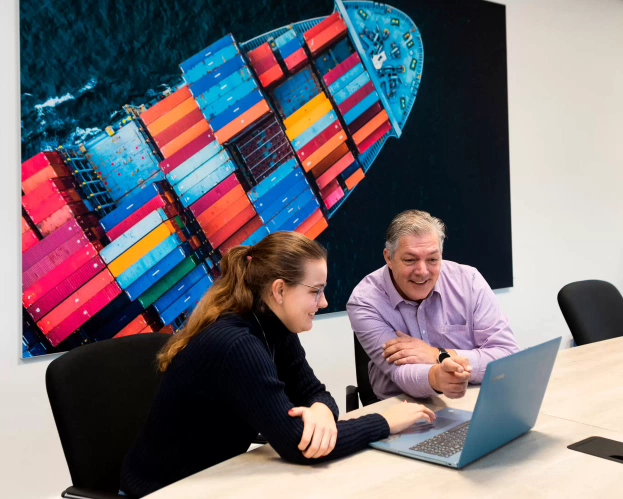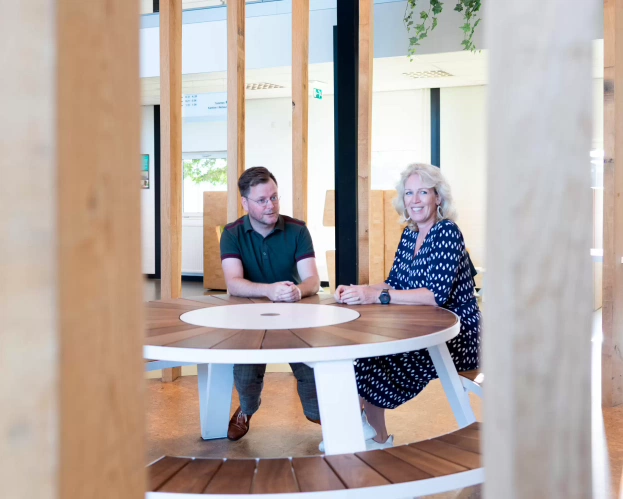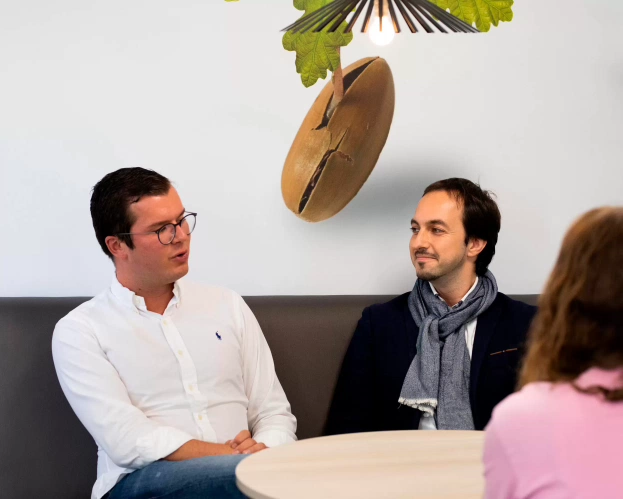
Programmes

Living in the Netherlands
- Information for parents/carers
- Our campuses
- Studying in the Netherlands
- Visa and insurance
- Holiday calendar
Get a good impression of what your study programme will look like.
Gain practical academic skills in the MSc Operations and SCM. Learn from experts through diverse classes, workshops, and excursions. Develop the personal and professional skills to succeed in a dynamic global business, working across diverse cultures.

Gain hands-on experience immediately.
Expand your knowledge thoroughly.
Collaborate successfully with diverse cultures.
Our MSc programme, offered in collaboration with the University of Plymouth (UoP), is structured across three academic terms. Depending on your country of origin, the applicable residence permit regulations in the Netherlands (if required), and your personal preferences, there are two distinct pathways to complete this degree:
Full Programme in the UK (Recommended for Non-EU Applicants Seeking UK Career Opportunities)If you are a non-EU applicant and place high value on international career prospects—particularly in the UK—we recommend enrolling in the MSc programme through Fontys and completing the entire course at the University of Plymouth in the UK. This route grants you a full UK student visa and may offer additional post-study benefits, such as eligibility for the UK Graduate Route visa (commonly referred to as the "UK search year visa") upon graduation.
Dual-Country Experience (Recommended for EU Applicants or Non-EU Applicants Seeking a Multinational Study Experience)If you are an EU applicant—or a non-EU applicant who values studying in both the Netherlands and the UK—you may choose to enrol through Fontys and follow a split-location study plan:
• Term 1 (September–December): Conducted at Fontys in Venlo, the Netherlands.
• Term 2 (January–May): Conducted at the University of Plymouth in the UK.
• Term 3 (May–September): Dedicated to your master’s thesis, which can be completed from any global location, provided you hold the appropriate legal residency or visa for that country.
Due to Schengen visa regulations (which typically require a 180-day waiting period after departure before reapplication), returning to the Netherlands for Term 3 may not be feasible. While this does not hinder the completion of your degree, it is essential to consider this limitation when selecting this pathway. In such cases, completing your thesis from your home country is a viable option, as supervision during Term 3 is conducted remotely by default.
• Term 1 is offered in both Venlo (Netherlands) and Plymouth (UK), and focuses on foundational knowledge in supply chains, production control systems, economics and maritime finance, business modelling, and academic research skills.
• Term 2 is delivered exclusively in Plymouth (UK), where you will choose one of three specialization pathways: International Logistics, International Procurement, or Operations Management. Each pathway includes a core module in Supply Chain Management.
• Term 3 is dedicated to your dissertation, which can be pursued from any location worldwide. You will receive academic supervision from a designated faculty member. The dissertation may follow a research-oriented approach or a practical format, where you collaborate with a company to address a real-world business challenge.
The following overview provides a detailed breakdown of the module structure for students following the dual-country pathway:

Understanding the implications of decision making in supply chains requires a solid understanding of both economic and financial principles. As Managing a supply chain means being aware of economic and financial implications of both external effects and internal changes to the supply chain in question, this module aims to create the fundamental knowledge necessary for such a skill.
In Economics, you will delve into various generic and specific economic concepts and dynamics that help understand the workings of supply chains. This will be done by practical application in direct proximity to these concepts. The economic part of this module is complemented by business finance & statistics in maritime industries, including interpretation of traditional accounts and analysis of corporate performance and approaches to investment appraisal.
A supply chain professional needs to understand the core principles and workings in supply chains, and should be able to base their decisions on quantitative and qualitative evidence. Therefore, the aim of this module is to provide a deeper introduction to the topic of supply chain management, and to complement this knowledge with quantitative methods for decision-making within the professional discipline.
Whilst one part of the module will focus on the core topic of Supply Chain Management and relevant practices and developments, the other part deals with quantitative problem-solving skills and optimization by means of appropriate supply chain tooling. The latter involves tackling supply chain related optimization problems and risk-analysis techniques using data present in the supply chain. Such techniques will not only be applied in practical contexts, but also their outcome and how to communicate it best makes for a part of the relevant insights within this module.

Sustainable development and social responsibility are fundamental drivers of supply chain practises around the world. This module provides students with an in-depth examination of such issues across the supply chain, taking into account differing perspectives and underlying drivers. The module provides students with a toolkit to effectively manage sustainable supply chains.
In this module you analyse the implications of decisions taken by international channel management in the context of international logistics. This includes evaluating roles of commercial institutions and assessing international logistics strategies.
In this module you analyse principles underlying procurement processes and strategies. You explore the development and centrality of procurement as an integrated business function in supply chains, its interaction with other functions and organisations.
This module considers how to use business operations to achieve sustainable competitive advantage. Operations strategy is highlighted, showing how it needs to inform and underpin the design and improvement of all operational processes to ensure increased cost efficiency and maximise operational effectiveness.

In the Project/Dissertation you will be expected to research a topic or problem related to your award title on the basis of relevant literature and appropriate empirical work. You may choose to participate in either an established research area or follow a line of work based on your own interest. This research project can be undertaken at any appropriate location worldwide.
At Fontys we believe that a range of different study approaches prepare you best for the business field after graduation; workshops, lectures, group work, guest lectures, assignments, group discussions, logistics excursions and case studies. All modules within the MSC are completed with a mix of group and individual assignments that may consist of reports, presentations or written exams (depending on the module).

Wondering what's to come after applying for this programme? Go over the entire admission process.
Please note! Start your housing search early.
You can sign up for online and live events throughout the academic year.
We are happy to help.